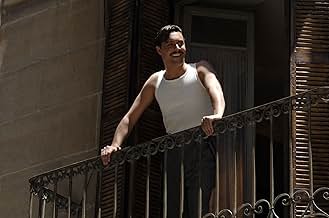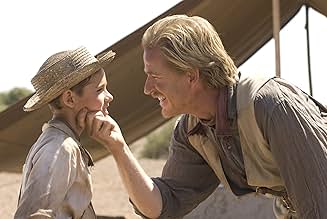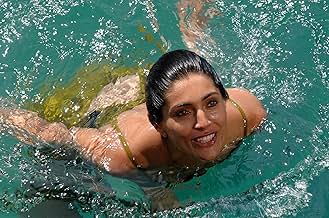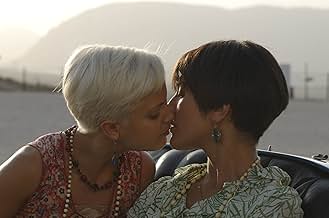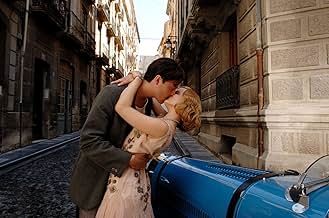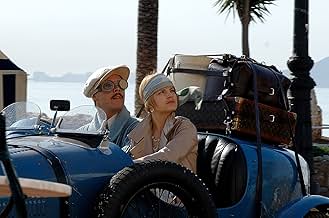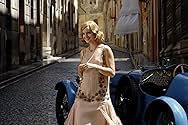PUNTUACIÓN EN IMDb
5,3/10
1,3 mil
TU PUNTUACIÓN
Un escritor estadounidense completa su servicio en la Primera Guerra Mundial y viaja por Europa con su esposa y una novia italiana. Basada en la novela de Ernest Hemingway.Un escritor estadounidense completa su servicio en la Primera Guerra Mundial y viaja por Europa con su esposa y una novia italiana. Basada en la novela de Ernest Hemingway.Un escritor estadounidense completa su servicio en la Primera Guerra Mundial y viaja por Europa con su esposa y una novia italiana. Basada en la novela de Ernest Hemingway.
Mathias Koie Levi Palsvig
- Young David
- (as Mathias Palsvig)
Héctor Tomás
- Patrice
- (as Hector Tomas)
Álvaro Roig
- Vladimir
- (as Alvaro Roig)
Yaël Belicha
- Girl Onlooker
- (as Yael Belicha)
María Miguel
- Nina
- (as Maria Miguel)
Enrique Zaldua
- Waiter #2
- (as Enrique Zoldua)
Argumento
¿Sabías que...?
- CuriosidadesThis is the fiftieth adaptation of an Ernest Hemmingway story.
- PifiasThe typewriter Catherine buys for David has a QWERTZ keyboard. This keyboard is common in German-speaking parts of Europe, but is not used in France where the movie takes place.
- Citas
David Bourne: You know you want to be careful about Absinthe. It tastes like remorse, yet it takes it away.
- Banda sonoraThe Jefferson Stomp
(uncredited)
Performed by Raimond Bugatti and his Platinum Lounge Syncopators
Reseña destacada
Based on a posthumously released novel written by Ernest Hemingway, Garden of Eden takes place prior to the Great Depression, during the Jazz age, following a successful young American writer, David Bourne (Jack Houston), and his new bride, Catherine (Mena Suvari), a rich heiress, who are on an extended honeymoon in Europe. During the honeymoon, Catherine starts to get restless and begins playing bizarre mind games with David, testing his devotion. To David's discomfort, she persuades him to role play in the bedroom, with her as the boy and him as the girl. Things get stranger when Catherine develops a relationship with an Italian girl, Marita (Caterina Murino), and brings her to him as a "present", even suggesting they take turns being David's wife.
Directed by John Irvin (Hamburger Hill, Dogs of War), this film is more character-driven than plot-driven. There is much sex going on, focusing on the strange love triangle between David, Catherine, and Marita. The focus and the pace of the film changes noticeably when it moves on to David's past memories of his father, an elephant hunter in Africa. These memories, which are quite out of place from the rest of the film, become material for David's new book.
This film is beautiful to look at. It is a period film--the mood, clothing, and environments recreate the early part of the 20th century in fine detail, soft sepia filters, and a pastel color scheme. There's an impressive tracking shot in the beginning of an outdoor banquet, of rich folks raising their glasses in slow motion. We soon see a naked lady being filmed at a picnic, re-enacting Manet's "The Luncheon on the Grass". Small moments like these amusingly portrays a certain mindset of this particular society. Advertisement
It the film, David Bourne appears to be Hemingway's alter ego. While Jack Huston looks like the young Hemingway, his character is far from the heavy-drinking, macho guy the famous author was known for. He is constantly pushed around by the neurotic Catherine, whom he is always trying to please, which becomes increasingly hard to do. Catherine has some amount of disdain for David's work and becomes jealous when Marita admits to having read his transcript. Throughout the film, David half-jokingly calls Catherine "Devil."
Admittedly, the characters here are not very engaging. Jack Houston does what he can with his role, but his character never feels like a whole person. Mena Suvari has a meatier role as Catherine, who brings much intensity to the film. However, we never quite know why she acts the way she does and her dialogue feels stilted. Caterina Murino (Casino Royale) is competent as Marita, despite the character's lack of complexity.
Given the title of the film, Garden of Eden, a reference to the Bible, one might say David represents Adam and Cartherine represents Eve. Perhaps the theme speaks about a picture-perfect couple who are tempted toward a wrong way. In this film, though, it appears to be mostly Catherine who brings things down for them. Or, it could just be that Catherine is actually the serpent (as David called her "Devil.") bringing Marita (Catherine's "present") as the fruit to tempt David to fall. It is indicated that Catherine wants to share her "sin" (Marita) with David to feel less guilty about her extramarital relationship with Marita.
One wonders if Hemingway could be using Catherine to represent certain attitudes within radical feminism. The film also touches upon morality and class. Catherine says something along the lines of "we are not like normal people--we can live our life however we want." Given that this film was based on an incomplete novel, it is hard to say what Hemingway really wanted to say, or if he had a particular message. It could just be a character study. As it is, the film feels uneven and the characters are not very engaging. Perhaps it is meant to be read as a novel and not seen as a film.
More of my movie review updates can be found at http://twitter.com/d_art
Directed by John Irvin (Hamburger Hill, Dogs of War), this film is more character-driven than plot-driven. There is much sex going on, focusing on the strange love triangle between David, Catherine, and Marita. The focus and the pace of the film changes noticeably when it moves on to David's past memories of his father, an elephant hunter in Africa. These memories, which are quite out of place from the rest of the film, become material for David's new book.
This film is beautiful to look at. It is a period film--the mood, clothing, and environments recreate the early part of the 20th century in fine detail, soft sepia filters, and a pastel color scheme. There's an impressive tracking shot in the beginning of an outdoor banquet, of rich folks raising their glasses in slow motion. We soon see a naked lady being filmed at a picnic, re-enacting Manet's "The Luncheon on the Grass". Small moments like these amusingly portrays a certain mindset of this particular society. Advertisement
It the film, David Bourne appears to be Hemingway's alter ego. While Jack Huston looks like the young Hemingway, his character is far from the heavy-drinking, macho guy the famous author was known for. He is constantly pushed around by the neurotic Catherine, whom he is always trying to please, which becomes increasingly hard to do. Catherine has some amount of disdain for David's work and becomes jealous when Marita admits to having read his transcript. Throughout the film, David half-jokingly calls Catherine "Devil."
Admittedly, the characters here are not very engaging. Jack Houston does what he can with his role, but his character never feels like a whole person. Mena Suvari has a meatier role as Catherine, who brings much intensity to the film. However, we never quite know why she acts the way she does and her dialogue feels stilted. Caterina Murino (Casino Royale) is competent as Marita, despite the character's lack of complexity.
Given the title of the film, Garden of Eden, a reference to the Bible, one might say David represents Adam and Cartherine represents Eve. Perhaps the theme speaks about a picture-perfect couple who are tempted toward a wrong way. In this film, though, it appears to be mostly Catherine who brings things down for them. Or, it could just be that Catherine is actually the serpent (as David called her "Devil.") bringing Marita (Catherine's "present") as the fruit to tempt David to fall. It is indicated that Catherine wants to share her "sin" (Marita) with David to feel less guilty about her extramarital relationship with Marita.
One wonders if Hemingway could be using Catherine to represent certain attitudes within radical feminism. The film also touches upon morality and class. Catherine says something along the lines of "we are not like normal people--we can live our life however we want." Given that this film was based on an incomplete novel, it is hard to say what Hemingway really wanted to say, or if he had a particular message. It could just be a character study. As it is, the film feels uneven and the characters are not very engaging. Perhaps it is meant to be read as a novel and not seen as a film.
More of my movie review updates can be found at http://twitter.com/d_art
- d_art
- 31 mar 2011
- Enlace permanente
Selecciones populares
Inicia sesión para calificar y añadir a tu lista para recibir recomendaciones personalizadas
- How long is The Garden of Eden?Con tecnología de Alexa
Detalles
- Fecha de lanzamiento
- Países de origen
- Sitio oficial
- Idioma
- Títulos en diferentes países
- Hemingway's Garden of Eden
- Localizaciones del rodaje
- Los Alcázares, Murcia, España(Hotel des Voyageurs scenes)
- Empresas productoras
- Ver más compañías en los créditos en IMDbPro
Taquilla
- Recaudación en Estados Unidos y Canadá
- 22.083 US$
- Fin de semana de estreno en EE. UU. y Canadá
- 12.404 US$
- 12 dic 2010
- Recaudación en todo el mundo
- 22.083 US$
- Duración1 hora 51 minutos
- Color
- Mezcla de sonido
- Relación de aspecto
- 1.85 : 1
Contribuir a esta página
Sugerir un cambio o añadir el contenido que falta

Principal laguna de datos
By what name was The Garden of Eden (2008) officially released in Canada in English?
Responde

